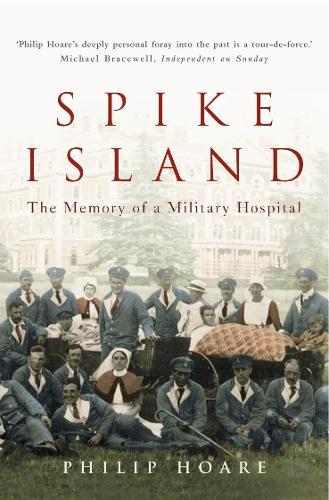
Spike Island: The Memory of a Military Hospital
(Paperback)
Publishing Details
Spike Island: The Memory of a Military Hospital
By (Author) Philip Hoare
HarperCollins Publishers
Fourth Estate Ltd
9th May 2002
26th March 2010
United Kingdom
Classifications
General
Non Fiction
Military institutions
Medical administration and management
355.720942276
Physical Properties
Paperback
432
Width 129mm, Height 198mm, Spine 26mm
290g
Description
The story of Netley in Southampton - its hospital, its people and the secret history of the 20th-century now includes an afterword uncovering astonishing evidence of Netley's links with Porton Down and the experiments with LSD in the 1950s. It was the biggest hospital ever built. Stretching for a quarter-of-a-mile along the banks of Southampton Water, the Royal Victoria Military Hospital at Netley was an expression of Victorian imperialism in a million red bricks, a sprawling behemoth so vast that when the Americans took it over in World War II, GIs drove their jeeps down its corridors. Born out of the bloody mess of the Crimean War, it would see the first women serving in the military, trained by Florence Nightingale; the first vaccine for typhoid; and the first purpose built military asylum. Here Wilfred Owen would be brought along with countless other shell-shocked victims of World War I - captured on film, their tremulous ghosts still haunted the asylum a generation later. In "Spike Island", Philip Hoare discusses the history and past of the building, and, in the process dealing with his own past, and his own relationship to its history.
Reviews
'Spike Island has kept me company these past few days. It is an astonishing book not only for what it contains but also for its synoptic vision and for its wonderful prose style. If 10per cent of the population read it, the place we live in would be much improved'. W.G.Sebald 'Philip Hoare's deeply personal foray into the past is a tour-de-force' Michael Bracewell, Independent on Sunday 'The story of the Royal Victoria Hospital is a fascinating one, and Mr Hoare's book extremely valuable' Anthony Daniels, Sunday Telegraph 'Hoare develops a gothic theme that marries glamour with morbidity and runs throughout the workHis literary tones - ghostly, haunting, reminiscent of du Maurier - find their echo is Netley's grim history' Nicola McAllister, The Observer
Author Bio
Philip Hoare is the author of six works of non-fiction: Serious Pleasures: The Life of Stephen Tennant (1990) and Noel Coward: A Biography (1995), Wildes Last Stand: Decadence, Conspiracy, and the First World War (1997), Spike Island: The Memory of a Military Hospital (2000), and Englands Lost Eden: Adventures in a Victorian Utopia (2005). Leviathan or, The Whale (2008), won the 2009 BBC Samuel Johnson Prize for non-fiction. Most recently, The Sea Inside (2013) was published to great critical acclaim. An experienced broadcaster, Hoare wrote and presented the BBC Arena film The Hunt for Moby-Dick, and directed three films for BBCs Whale Night. He is Visiting Fellow at Southampton University, and Leverhulme Artist-in-residence at The Marine Institute, Plymouth University, which awarded him an honourary doctorate in 2011.
